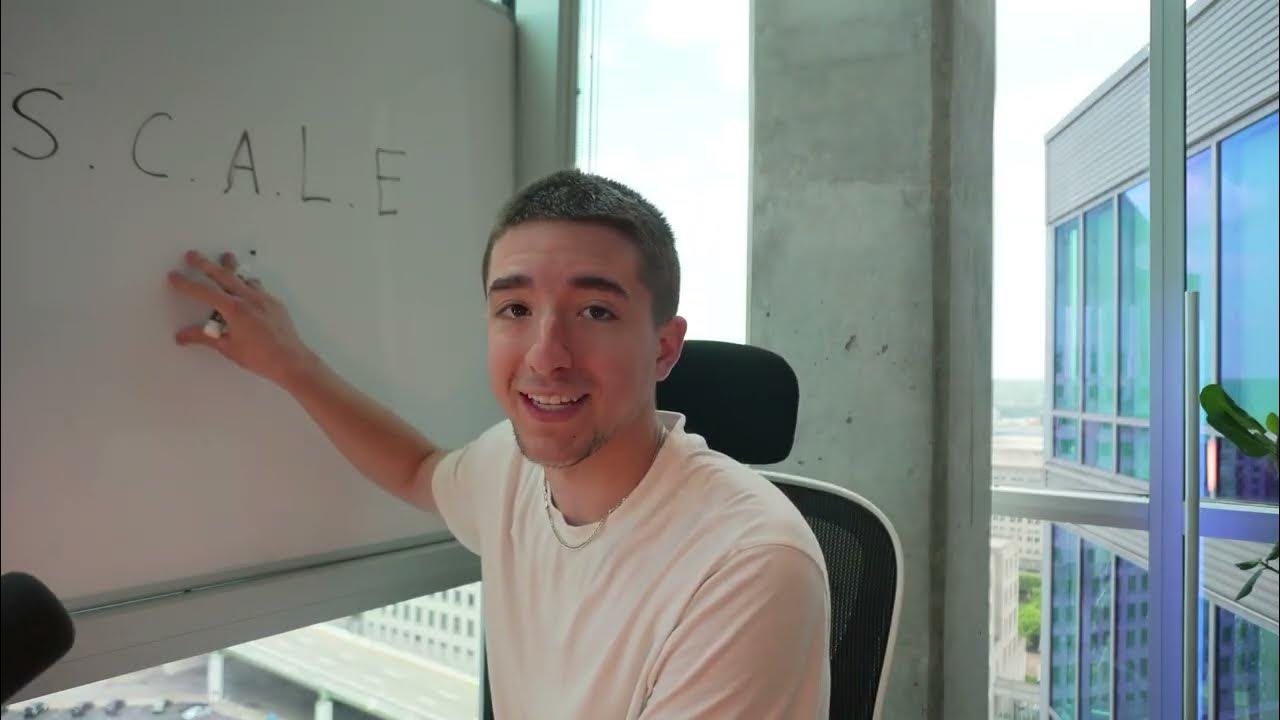I Fully Automated My SMMA Service Delivery (Tutorial)
Summary
TLDRThe speaker emphasizes the importance of systemization in scaling a business, contrasting the inefficiency of relying on unsystematic 'SM guys' with the power of creating a 'system of systems' that operate autonomously. They share their personal journey of transforming their calendar from chaos to order through strategic hiring and system implementation. The video delves into tangible and intangible systems, detailing the process of automating business operations and intellectual training for consistent outcomes. The speaker's experience illustrates the transition from manual client management to a streamlined, efficient service delivery model, highlighting the pivotal role of systems in delegation and scaling.
Takeaways
- 😀 The speaker emphasizes the importance of having robust systems in place to compete effectively in the Service Management (SM) industry.
- 🤖 A 'system' in this context refers to a set of processes that can operate independently, not just a virtual assistant (VA), but a comprehensive 'system of systems'.
- 🛠️ The speaker advocates for automating as many steps as possible in the customer journey, from lead generation to client success, to create a seamless and efficient business operation.
- 📅 The speaker shares a personal example of how implementing systems transformed their calendar, reducing the workload and allowing for better delegation.
- 🔧 The speaker distinguishes between 'tangible systems' like workflows and 'intangible systems' or intellectual processes that guide decision-making in the business.
- 📝 The importance of having scripts and SOPs (Standard Operating Procedures) for various business functions is highlighted to ensure consistency and reliability.
- 💡 The speaker suggests that understanding when and how to use these systems is crucial, which is part of the intellectual systems that need to be taught to team members.
- 📈 The speaker explains that systems should be in place before outsourcing tasks to ensure that there is a clear standard for performance and efficiency.
- 👥 The speaker discusses the process of hiring and the importance of having systems to train new hires effectively, ensuring they can perform tasks with minimal supervision.
- 🚀 The speaker shares their personal strategy for scaling their business by first outsourcing client launches to an admin VA and then to a full-time operations manager.
- 🔄 The speaker concludes by stressing the need to break down service delivery into its components and systematically outsource tasks once the right systems are in place.
Q & A
What does the speaker suggest is the key to competing against most SM guys?
-The speaker suggests that having the right systems is the key to competing against most SM guys, as they often lack understanding of what a system is.
What does the speaker mean by 'turning your business into a machine'?
-The speaker means creating a system of systems within the business that work independently, allowing the business owner to operate efficiently with minimal effort.
Why did the speaker's calendar look like a nightmare before automation?
-The speaker's calendar was a nightmare before automation because they were manually handling numerous tasks without any systems in place to streamline the process.
What is the main focus of the speaker's discussion in the video?
-The main focus of the speaker's discussion is on service delivery and the importance of automating it through the creation of systems.
What are the two main types of systems the speaker wants to discuss?
-The two main types of systems the speaker wants to discuss are tangible systems, which include workflows, zaps, and scripts, and intangible systems, which are intellectual systems or ways of thinking.
Why is it important to automate as many steps as possible in the customer's journey?
-It is important to automate as many steps as possible in the customer's journey to create a seamless and efficient process, reducing the need for manual intervention and increasing the reliability of the service delivery.
What is the role of a VA in the context of the speaker's discussion?
-In the context of the speaker's discussion, a VA is not a system but a person who can facilitate systems, manage them, or perform labor that is part of a system.
What does the speaker suggest is the first step in creating a reliable system for service delivery?
-The speaker suggests that the first step in creating a reliable system for service delivery is to break down the process into its smallest components and create scripts or guidelines for each part to ensure controlled inputs and outputs.
Why is it crucial to have systems in place before outsourcing tasks to people?
-It is crucial to have systems in place before outsourcing tasks to ensure that the people you hire can follow a clear and efficient process, allowing you to gauge their performance and maintain the quality of service.
What is the significance of having a private scaling group according to the speaker?
-The significance of having a private scaling group is to share intellectual systems and ways of thinking, providing a framework for members to reliably scale their businesses without guesswork.
How does the speaker describe the process of hiring and training someone using systems?
-The speaker describes the process of hiring and training someone using systems as creating SOPs (Standard Operating Procedures) and training materials that allow the new hire to perform tasks efficiently and correctly, reducing the need for the business owner's direct involvement.
Outlines

此内容仅限付费用户访问。 请升级后访问。
立即升级Mindmap

此内容仅限付费用户访问。 请升级后访问。
立即升级Keywords

此内容仅限付费用户访问。 请升级后访问。
立即升级Highlights

此内容仅限付费用户访问。 请升级后访问。
立即升级Transcripts

此内容仅限付费用户访问。 请升级后访问。
立即升级浏览更多相关视频

How We Created 151 Appointments in 1 Month with Our Inbound Marketing System

6 Steps To Scaling a Successful Real Estate Team and/or Real Estate Brokerage with Joshua Smith

how to force yourself to be consistent and do hard things

Why You Need Systems in Place to Scale Your Business

How to Build Systems to Actually Achieve Your Goals

How To Become A Systems Integrator | Operations As A Service Business Model 2024
5.0 / 5 (0 votes)
